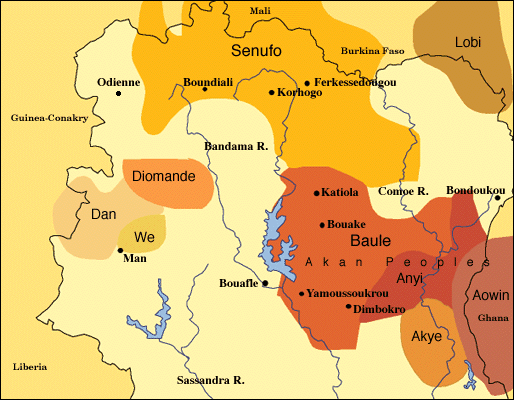

Côte d'Ivoire Information |

![]() General Information
for Côte d'Ivoire
General Information
for Côte d'Ivoire
| Country: | Côte d'Ivoire |
| Location: | West Africa |
| Independence: | August 7, 1960 |
| Nationality: | Ivoirian |
| Capital City: | Yamoussoukro |
| Population: | 14,791,257 |
| Important Cities: | Abidjan, Bouake, Korhogo, Gagnoa |
| Head of State: | General Robert Guei |
| Area: | 323,750 sq.km. |
| Type of Government: | Military |
| Currency: | 500 FCFA=1 USD |
| Major peoples: | Baule, Bete, Senufo, Malinke, Agni |
| Religion: | African religion 63%, Muslim 25%, Christian 12% |
| Climate: | Tropical |
| Literacy: | 54% |
| Official Language: | French |
| Principal Languages: | Dioula, Agni, Baule, Kru, Senufo, Mandinka |
| Major Exports: | Coffee, Cocoa, Banana, Palm Oil |
| Pre-Colonial History | Very little is known about the early history of Côte d'Ivoire. France made its initial contact with Côte d'Ivoire in 1637, when missionaries landed at Assinie near the Gold Coast (now Ghana) border. In the 18th century, the country was invaded by two related peoples-the Anyi, who occupied the southeast, and the Baule, who settled in the central section. In 1843 to 1844, Admiral Bouet-Williaumez signed treaties with the Kings of Grand Bassam and Assinie regions, placing their territories under a French protectorate. French explorers, missionaries, trading companies, and soldiers gradually extended the area under French control inland from the lagoon region. However, conquest was not completed until 1915. From 1904 to 1958, Côte d'Ivoire was a constituent unit of the Federation of French West Africa. It was a colony and an overseas territory under French rule. Until the period following World War II, governmental affairs in French West Africa were administered from Paris. |
| Post-Colonial History | In December 1958, Côte d'Ivoire became an autonomous republic within the French community as a result of a referendum that brought community status to all members of the old Federation of French West Africa, except Guinea, which had voted against association. Côte d'Ivoire became independent on August 7, 1960, and permitted its community membership to lapse. Côte d'Ivoire's contemporary political history is closely associated with the career of Felix Houphouet-Boigny, President of the Republic and leader of the Parti Democratique de la Côte d'Ivoire (PDCI), until his recent death. He was one of the founders of the Rassemblement Democratique Africain (RDA), the leading preindependence interterritorial political party in French West African territories (except Mauritania). Houphouet-Boigny first came to political prominence in 1944 as founder of the Syndicat Agricole Africain, an organization that won improved conditions for African farmers and formed a nucleus for the PDCI. In 1959, Houphouet-Boigny reinforced his position as a dominant figure in West Africa by leading Côte d'Ivoire, Niger, Upper Volta (now Burkina Faso), and Dahomey (now Bénin) into the Council of the Entente, a regional organization promoting economic development. |